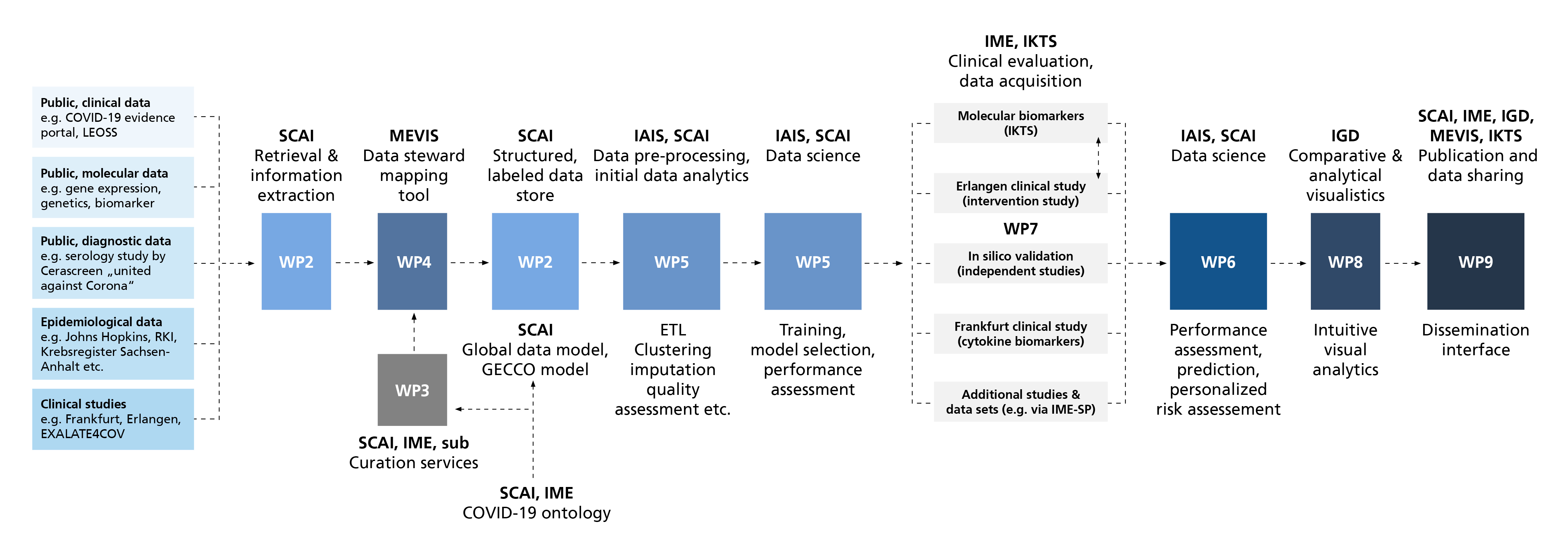COPERIMOplus is funded by Fraunhofer Gesellschaft. Usually, Fraunhofer has a very limited internal funding programme, but in the course of the COVID-19 pandemic, the board of directors started a competitive funding effort at much bigger scale. The COPERIMOplus consortium was successful with the proposal of generating personalized risk models for patients. Departments and groups from 6 Fraunhofer Institutes contribute to the overall workflow underlying COPERIMOplus; this workflow is shown below.
Fraunhofer consortium

- WP1: Management
- WP2: Retrieval / Information extraction
- WP3: Curation / Mapping / Data wrangling
- WP4: Curation interface / Data stewardship
- WP5: Data pre-processing / Quality assessment
- WP6: Data modeling / AI / Data science
- WP7: Clinical trials / Validation data sets
- WP8: Visualistics / Visual analytics
- WP9: Dissemination / Communication / Publications
Fraunhofer consortium
- Fraunhofer Institute for Algorithms and Scientific Computing SCAI, Sankt Augustin
- The Software und Scientific Computing group helps in building a data catalog by identifying, organizing and structuring information on world wide COVID-19 clincal trials. It is scanning offcial trial registries, the public literature including preprints and meta data repositories. In the second phase the group is helping in mapping clinical trial data to a standardized ontology model with clinical variables of interest based on the The German Corona Consensus Dataset (GECCO).
- The AI and Data Science group is responsible for AI-based risk models and helps manage the overall project.
- Applied Semantics (SEM) group focuses on data curation, shared semantics and knowledge graphs. In the context of COPERIMOplus project, SEM group is involved in collecting longitudinal clinical datasets of COVID patients which could be used for personalized risk prediction. Data wrangling and provisioning of COVID datasets readily available for the AI/ML approaches is one of the key task of SEM group.
- Fraunhofer Institute for Molecular Biology and Applied Ecology IME (ITMP), Hamburg
- The Fraunhofer ITMP positions itself along the pharmaceutical value chain from target identification, drug screening, translational preclinical validation to clinical trials, using the 4D principle. The operation of its high-throughput laboratories provides a special competence in the 4D-data and FAIR handling of research data. The 4D-drugs focus on the investigation of immune-mediated diseases. Through years of experience and close cooperation with clinicians, the ITMP offers a highly specialized spectrum of disease models, formulation of therapeutic pathways and bioanalytics. Clinical questions and tests are performed in a 4D-clinic with a broad network.
- Fraunhofer Institute for Digital Medicine MEVIS, Bremen
- The mission of the Fraunhofer Institute for Digital Medicine MEVIS is to advance health care by researching and bringing to market solutions for digital medicine, bridging integrated diagnostics, intelligent interventions, multimodal imaging, and healthcare informatics.
In COPERIMOplus, MEVIS develops INDAST, an Intelligent DataSteward, based on AI and modern web interface support to consolidate curation, mapping and quality assessment of heterogeneous clinical and study data. Automated process control, targeted annotations and focussed interaction prepare the Big Data approach for meaningful and personalized data modelling and risk analyses.
- The mission of the Fraunhofer Institute for Digital Medicine MEVIS is to advance health care by researching and bringing to market solutions for digital medicine, bridging integrated diagnostics, intelligent interventions, multimodal imaging, and healthcare informatics.
- Fraunhofer Institute for Intelligent Analysis and Information Systems IAIS, Sankt Augustin
- Fraunhofer IAIS is one of the leading scientific institutes in the fields of Artificial Intelligence, Machine Learning and Big Data in Germany and Europe.
In COPERIMOplus, Fraunhofer IAIS is developing novel machine learning algorithms for the predictive analysis of clincal and biomarker data. The goal is to implement intelligent, performant and trustworthy risk profiles to understand and fight Covid-19.
- Fraunhofer IAIS is one of the leading scientific institutes in the fields of Artificial Intelligence, Machine Learning and Big Data in Germany and Europe.
- Fraunhofer Institute for Ceramic Technologies and Systems IKTS, Dresden
- The Fraunhofer IKTS in Forchheim provides correlative workflows based on complementary microscopy and spectroscopy techniques. Our institute uses state-of-the-art instruments working with light, electron, ion and X-ray microscopies as well as high-resolution Raman and infrared spectroscopies to generate heterogeneous large data volumes in an extended analytical context. Statistical and pattern recognition methods, especially machine and deep learning algorithms are employed for quantitative evaluation of imaging and spectral data. This experimental basis is used for research fields in bio-medicine, information and energy technologies as well as environmental analysis.
- Fraunhofer Institute for Computer Graphics Research IGD, Darmstadt
- Fraunhofer IGD’s mission is to support humans in mastering the increasing complexity of computer systems and volume of data in the age of digitization. With its expertise in the field of information visualization and visual analytics, novel solutions can be tailored directly to the data and tasks of our partners and customers. In the process, Fraunhofer IGD relies on a wide range of innovative visualization techniques which are already successfully used in the medical domain. These techniques can be combined with automated data processing and machine learning, enabling experts to make well-founded decisions based on complex and massive amounts of data.
